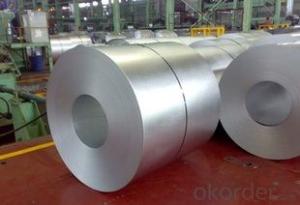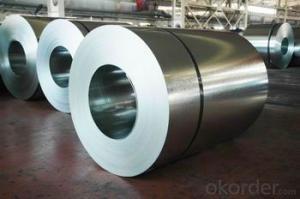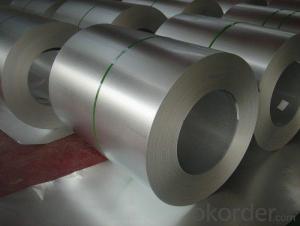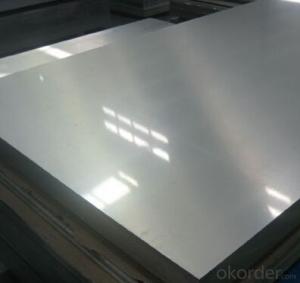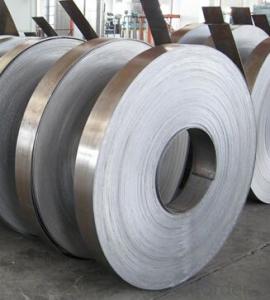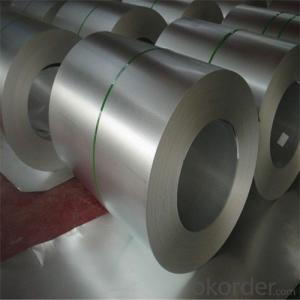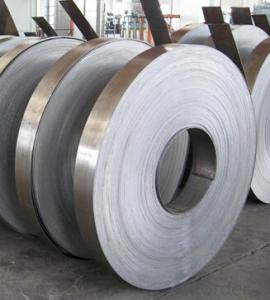HOT-DIP ALUZINC STEEL COIL
- Loading Port:
- China Main Port
- Payment Terms:
- TT OR LC
- Min Order Qty:
- -
- Supply Capability:
- -
OKorder Service Pledge
OKorder Financial Service
You Might Also Like
1.Mateials:SGCC,DX51D / DX52D /S250,280GD
2.Size:width:600-1250mm(900mm,1215mm,1250mm,1000mm the most common)
thickness:0.15-2.0mm
length:1000-6000mm,as your require
3.Zinc coating :60-180g( as required)
4.Coil id:508mm
5.Coil weight: 3-5MT(as required)
6. Surface:regular/mini/zero spangle, chromated, skin pass, dry etc.
7. Application:
With excellent cold bending molded manufacturablity, good decoration effect, strong anti-corrosion ability, galvanized steel coils and sheets are also pollution-free and easily recycled. Accordingly, they can be used as final products and basic plates of color coated steel coils
8.Packaging Details:
Standardexport package.
Othertypes of packing can be customized as per client's requirements
- Q: which one(glass or steel)has more power and velocity? im planning on using my slingshot for hunting.
- steel fo shizzle, glass can break, but steal goes threw. And wat are u hunting for dear? lol
- Q: Help me compare the speed of sound in air, water, and steel please?Thanks.
- Speed Of Sound In Steel
- Q: We just installed a stainless steel electric stove, what is the best way to keep it clean and shiney?
- I have a combo of black and stainless in my kitchen; not sure which one is worse some days. For normal everyday stuff, hot, soapy (Dawn), clean dishwater and a microfiber cloth work great. For quick touch ups, a 50/50 mixture of window cleaner and rubbing alcohol also works great. The window cleaner gets the grease and the alcohol helps with streaks and makes the cleaner germ killing. Use with a microfiber cloth. For really nasty burned on stuff, I'd use a sponge with a non-stick cookware safe nylon scrub pad on it and some of the hot, soapy water. Just lay the damp sponge on the spot, let it soak a bit and see if it comes off. If not, try a little Barkeeper's Friend. Dampen, sprinkle, smear it around a little and let it soak for about 10 minutes. Then scrub with the sponge. Wipe up the residue with the microfiber cloth. The microfiber cloths are really key; they wipe more efficiently than any sponge, wipe, paper towel, dish rag. Get several and change them out frequently. You just wash and dry them; no fabric softener and you're ready to use them again. And it wouldn't hurt to keep a protective coat of a good stainless steel product on there either. That helps keep the stuff from getting such a good hold. But I've found that most of those are pretty bad at cleaning; so clean it first, then polish.
- Q: How do steel coils contribute to the marine vessel construction industry?
- Steel coils are essential components in the marine vessel construction industry as they play a crucial role in the fabrication of various structural elements of ships and boats. These coils are typically made of high-quality steel and are used in a variety of ways to contribute to the construction and performance of marine vessels. Firstly, steel coils are utilized in the construction of the hull, which is the main body of the ship. The hull requires strong and durable materials to withstand the harsh conditions of the sea, including waves, corrosion, and impacts. Steel coils provide the necessary strength and integrity to the hull, ensuring the vessel's structural integrity and safety. Moreover, steel coils are also employed in the fabrication of decks, bulkheads, and other internal structures of marine vessels. These components are crucial for dividing the ship into compartments, providing stability, and supporting various equipment and machinery. Steel coils are known for their excellent tensile strength, which allows them to bear heavy loads and resist deformation, making them ideal for constructing these vital components. Additionally, steel coils are used in the construction of propulsion systems and other mechanical parts of marine vessels. These coils are often shaped and formed into specific components, such as shafts, gears, and propellers, which are critical for the vessel's propulsion and maneuverability. The high strength and durability of steel coils ensure the reliability and efficiency of these mechanical systems, enabling smooth navigation and operation of the vessel. Furthermore, steel coils contribute to the marine vessel construction industry by enhancing the overall safety and longevity of ships and boats. Steel is known for its resistance to corrosion, which is a significant concern in marine environments due to the presence of saltwater. By utilizing steel coils, marine vessels can withstand the corrosive effects of seawater, reducing the need for frequent maintenance and repair. This, in turn, improves the lifespan of the vessel and reduces the risk of accidents or failures at sea. In conclusion, steel coils are indispensable in the marine vessel construction industry. These coils provide the necessary strength, durability, and resistance to corrosion, ensuring the safety, performance, and longevity of ships and boats. From the construction of the hull to the fabrication of internal structures and mechanical components, steel coils play a vital role in every aspect of marine vessel construction.
- Q: What are the common methods of testing the durability of steel coils?
- Steel coils undergo various testing methods to assess their durability, strength, and resistance to different stresses and conditions. Some commonly used techniques include: 1. Tensile testing: This method measures the maximum stress a coil can bear before breaking or deforming by subjecting it to tension. It provides valuable insights into the strength and ductility of steel coils. 2. Bend testing: This method evaluates the flexibility and resistance to deformation of steel coils by bending them to a specific angle and checking for cracks or fractures. It is essential for assessing coil durability in industries like construction or automotive. 3. Impact testing: This method determines the ability of steel coils to withstand sudden shocks or impacts. It involves striking the coil with a heavy object and measuring energy absorption or deformation. Impact testing helps identify coil toughness and resistance to sudden loading conditions. 4. Corrosion testing: Steel coils often face corrosive environments like moisture or chemicals. Corrosion testing examines the resistance of steel to degradation caused by these agents. Salt spray or electrochemical testing simulates and evaluates coil durability in corrosive conditions. 5. Fatigue testing: This method assesses the ability of steel coils to endure repeated loading and unloading cycles. It subjects the coil to cyclic stresses until failure. Fatigue testing is crucial in machinery or infrastructure applications where coils experience repetitive loading. 6. Hardness testing: This method gauges the resistance of steel coils to indentation or scratching, providing information about their strength and wear resistance. Common hardness tests include Brinell, Rockwell, and Vickers methods. 7. Non-destructive testing: In addition to the destructive methods mentioned above, non-destructive techniques like ultrasonic testing, magnetic particle inspection, or X-ray testing are used to detect internal defects or flaws without damaging the coil. By utilizing these testing methods, manufacturers and industries can ensure that steel coils meet the required durability standards and perform reliably in their intended applications.
- Q: it has 2 be 20 inches overall, and 2and1/2 inches wide and .25 or more inches thick... im thinking truck steel but im not sure thx
- I made mine from a power hack saw blade. Granted it isn;t a quarter inch thick but it sure works well. Used the tooth part for the blade edge, just ground off the teeth. I can use a hammer or a stone on he back side of the blade to chop through the bone when cleaning deer.
- Q: i need working shoes for women that have steel toe shoes? What store do they sell them in . i live in c.a.
- Steel Toe Shoes Walmart
- Q: How are steel coils stored to prevent damage?
- Steel coils are typically stored in a way that prevents damage and ensures their integrity. One common method is to stack the coils in a horizontal position. This helps distribute the weight evenly across the coils, minimizing the risk of deformation or damage. In addition, wooden or steel dunnage is often placed between each layer of coils to provide support and prevent them from shifting during storage or transportation. To further protect the coils from damage, they are often stored indoors or in covered areas to shield them from exposure to the elements. This helps prevent rusting or corrosion, which can compromise the quality of the steel. If outdoor storage is necessary, the coils may be covered with weather-resistant tarps or protective coatings to minimize the impact of rain, snow, or sunlight. Furthermore, it is important to consider the stacking height to prevent excessive pressure on the lower coils. To avoid damage, coils are typically stacked in a way that ensures the weight from the upper layers is distributed evenly across the lower ones. This can include using specialized stacking equipment or racks designed to handle the weight and dimensions of the coils. Overall, proper storage of steel coils involves careful consideration of weight distribution, protection from the elements, and minimizing contact between coils to prevent damage and maintain their quality.
- Q: Does anyone know what colour steel is?How hard steel is?The density of steel?Conductivity of steel? (Heat and electricity)Reactivity of steel?Melting and boiling points of steel?And the malleability and ductility of steel?Ive looked all over the net and i cant find anything. Can someone please answer these questions or give me a website?THANKS!
- I'm really finding it hard to believe that you've look all over the net and can't find out anything about steel. A Google search on steel turns up 270 MILLION hits, with the first being good, ole, Wikipedia. A quick glance down the article shows up much of what you want. But keep in mind that that steel is not a single substance. There are many different kinds of steels and each has its own properties. Obviously, steel is a metal, so it is a good conductor of heat and electricity. It can be drawn into wires, so it is ductile. It's hard. It's harder than iron. That's the whole point for making steel. The boiling point and freezing points will depend on the type of steel. But please don't insult us by saying you can't find anything about steel. That simply can't be true.
- Q: How are steel coils used in the appliance industry?
- Steel coils are used in the appliance industry for a variety of purposes such as manufacturing parts, components, and frames for appliances like refrigerators, washing machines, and ovens. The coils are processed and shaped into specific forms to provide strength, durability, and stability to the appliances.
Send your message to us
HOT-DIP ALUZINC STEEL COIL
- Loading Port:
- China Main Port
- Payment Terms:
- TT OR LC
- Min Order Qty:
- -
- Supply Capability:
- -
OKorder Service Pledge
OKorder Financial Service
Similar products
Hot products
Hot Searches
Related keywords
